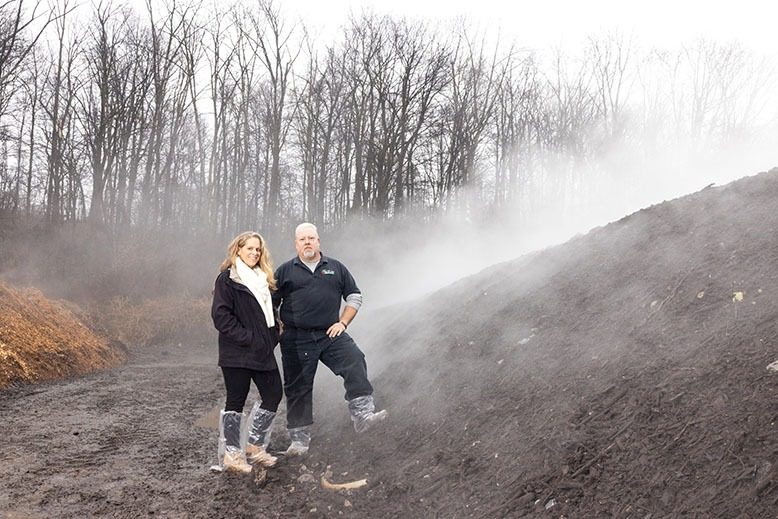
You would expect the most densely populated U.S. state—called the Garden State for its rich farming history—would boast a multitude of facilities that leverage its enormous volume of food waste for composting. You would be wrong.
In the far reaches of Sussex County, New Jersey’s sole commercial-scale, open-air organics composter has, since 2005, been quietly converting table scraps from supermarkets and food-distribution centers all over the region.
To date, Ag Choice in Andover has transformed nearly 6.48 million cubic feet of organic waste into usable topsoil for garden centers, athletic fields and some of the state’s remaining farms. For co-owner Jay Fischer, aiding a life cycle as old as time is just good business.
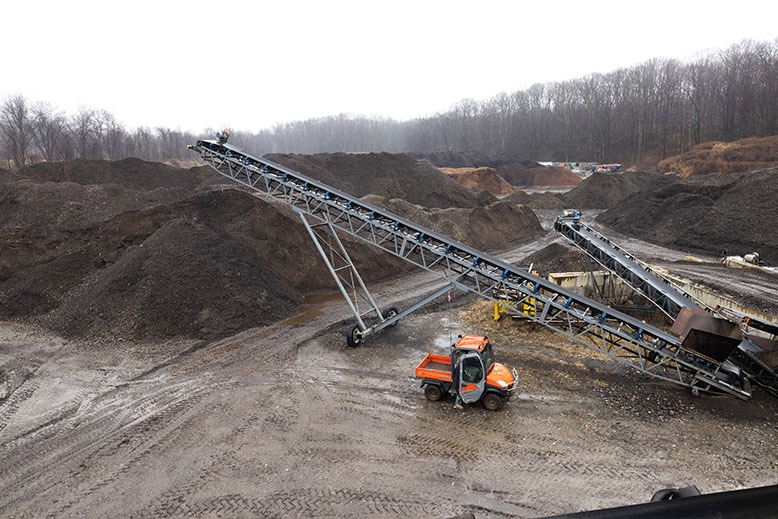
Ag Choice is the only large-scale, open-air organics composter in New Jersey. Photo by Christopher Lane
“The amount of waste going into landfills is staggering. If you can collect some of it and take advantage of the natural decomposition process, you’ll have a reusable product we really need,” Fischer says on a rare break from overseeing the company’s cavernous 15-acre intake facility.
Staggering is an understatement.
More than 9 million tons of garbage are deposited in New Jersey’s registered landfills each year, according to the state Department of Environmental Protection (DEP).
Despite controls to prevent leakage of toxins from these dumping grounds, some is inevitable, adversely impacting soil, water and air quality. And nontoxic gases such as methane and carbon dioxide, landfills’ primary emissions, are the main drivers of climate change.
But without an understanding of the science of composting, it can cause similar hazards.
In the wrong hands, Fischer cautions, the open-air tract where his staff deposits all this organic matter would be full of toxins that could ultimately leach into nearby waterways—and emit a stench that would bring flies in swarms.
“It has to be done properly,” he says. “You can’t beat Mother Nature.”
As stewards of the environment know well, fighting nature, even if well-intentioned, has serious consequences.
Ag Choice is able to avoid the problematic, smelly aftereffects of composting and instead create a delicate, chemical-free (and non-stinky) balance of nitrogen and carbon.
This is achieved by spreading food waste atop leaves and lawn clippings from the company’s extensive municipal public-works clientele.
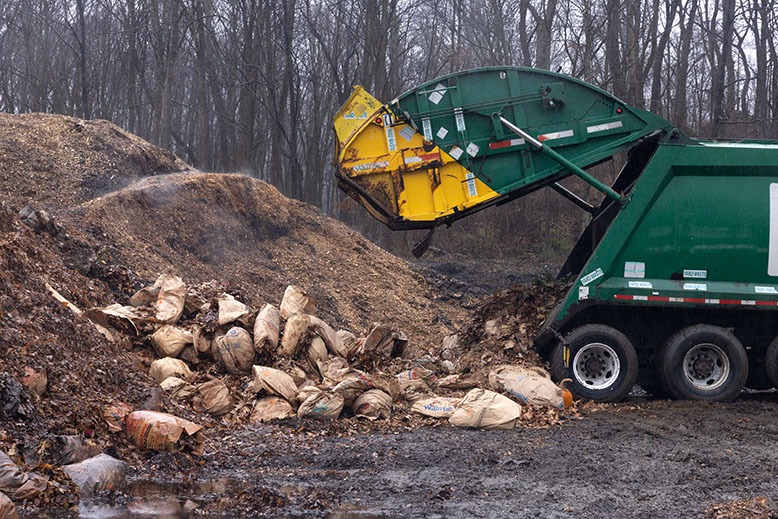
A truck delivers leaves to be composted. Photo by Christopher Lane
The greenery, in turn, sits on a bottom layer of wood chips that provide the necessary oxygen component to the mix. This stew is arranged in massive windrows at the 14-acre property that Ag Choice leases a few miles from their warehouse.
The path from concept to successful operation began in 1997, when Fischer, a Newton native, and his parents launched a lumber mill and earned extra income selling the wood shavings to area horse farms for bedding.
Realizing horse and other livestock manure could be turned into compost, Fischer made notes for a future project, stowed them away, and turned his attention to the construction boom of the aughts.
When his mother died in 2004, Fischer’s wife, Jill, assumed her bookkeeping duties and discovered the dormant file with his project idea. In 2005, after drafting a business plan, the couple applied for and received a DEP permit for a small composting operation.
With research and development funding they received the following year from the Natural Resources Conservation Service (NRCS), a U.S. Department of Agriculture agency, the Fischers were able to finance the purchase of waste-collection containers and a specially sealed truck for transporting them.
Ag Choice was off and running.
That was 16 years ago, and Evan Madlinger, state resource conservationist, says the NRCS in New Jersey “is happy to have been a small part of Ag Choice’s success. We knew we wanted to assist them in solving the problem of agricultural and food waste across the state, and their continued progress toward tackling this issue is encouraging.”
Currently, the company processes discarded supermarket produce from a handful of ShopRites in the region, while the other two-thirds of its incoming materials are comprised of municipal leaves and manufacturing organics such as coffee, nut, leaf, snack food and tea waste.
Chief among this last group is the entire North American stock of spent Nespresso aluminum capsules; aluminum is far more easily recyclable than the plastic pods favored by most other coffee makers.
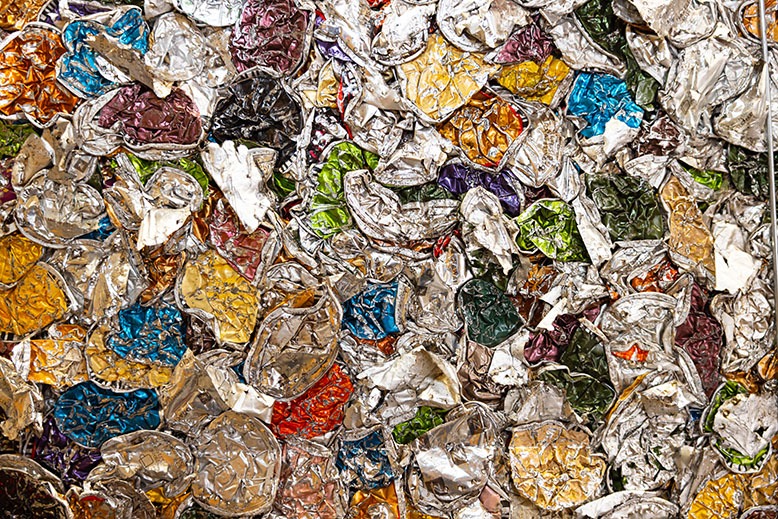
Nespresso capsules are bundled and sent for further recycling. Photo by Christopher Lane
Arriving by trailer load in prepaid recycling bags from one of the Swiss company’s thousands of collection points, the capsules move on a conveyor belt through an apparatus Fischer fashioned to remove miscellaneous consumer garbage. The aluminum is crushed and bundled into half-ton bales—seven per day.
The magnitude of the operation is proof positive of the environmentally sound “choice” that Fischer explains seeded the business’ agriculture-based name. In 2008, when the building market collapsed and the couple was forced to close the sawmill, the Fischers were able to focus solely on composting. Almost immediately, the business turned a profit.
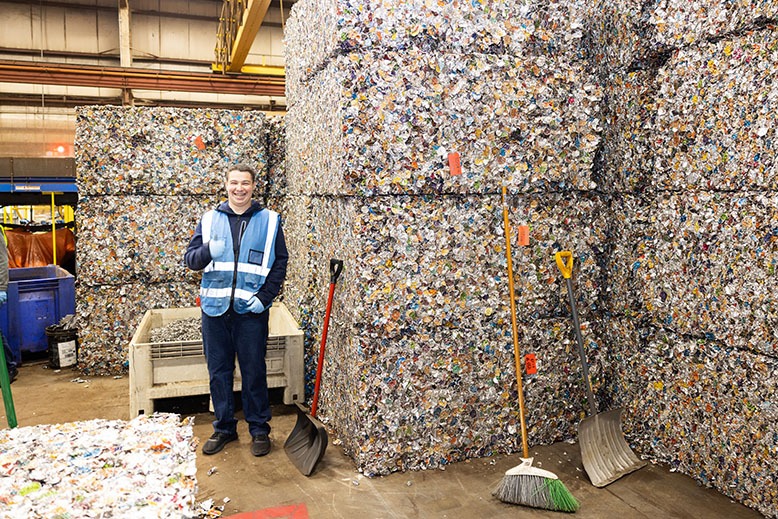
Students from local high schools take part in Ag Choice’s employment training. Photo by Christopher Lane
In an attempt to give back to their largely rural host community, where vocational opportunities can be scarce, the company also hosts employment training for students at more than a half-dozen area high schools. Job-skills coaches oversee students unpacking cartons and cardboard sleeves of unused coffee capsules that failed to meet Nespresso standards. The rejects are fed into a machine Fischer designed to separate aluminum from coffee.
This task falls to Jeff Bond, one of Ag Choice’s 16 full-time staffers and a participant in an employment program at Sussex County’s chapter of ARC, an organization that serves people with developmental disabilities.
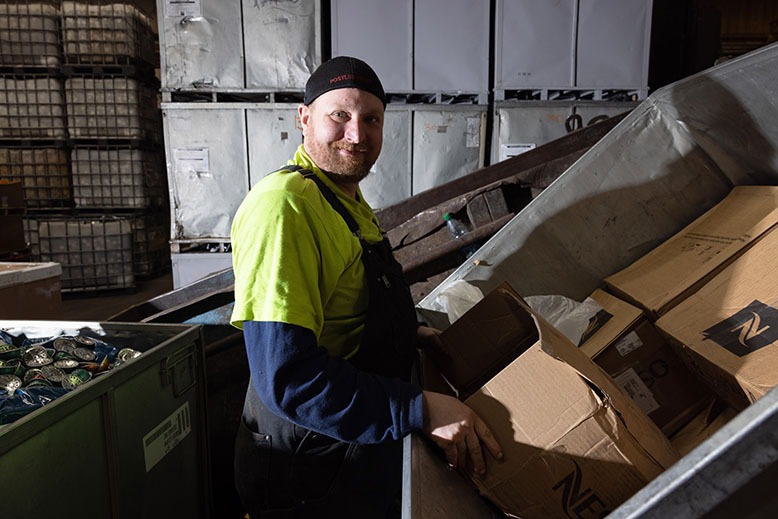
Jeff Bond is one of 16 full-time staffers. Photo by Christopher Lane
Fischer was impressed with Bond’s work ethic; the Newton resident, 39, bicycled to Ag Choice during a snowstorm when his parents could not navigate the roads with their car. “You really smell the coffee,” says Bond, smiling as he climbs a bale of Nespresso capsules to check its wrapping, the aroma of grounds permeating the air beneath the facility’s 30-foot ceiling.
Once transported to the composting site, the coffee joins a rich stew that includes loose organic waste which Ag Choice receives directly from its sources.
The material is aerated twice weekly by the long arms of a turning machine employees steer up and down the 35 rows, driving the ambient temperature to 150 degrees; the level is necessary to kill off any harmful microbes in the food waste.
Site scientist Kristine Paff monitors the windrows’ moisture content, aiming for an equilibrium that fosters the desired breakdown while minimizing smells. Staffers use a screen to weed out large sticks and errant plastic from the finished compost.
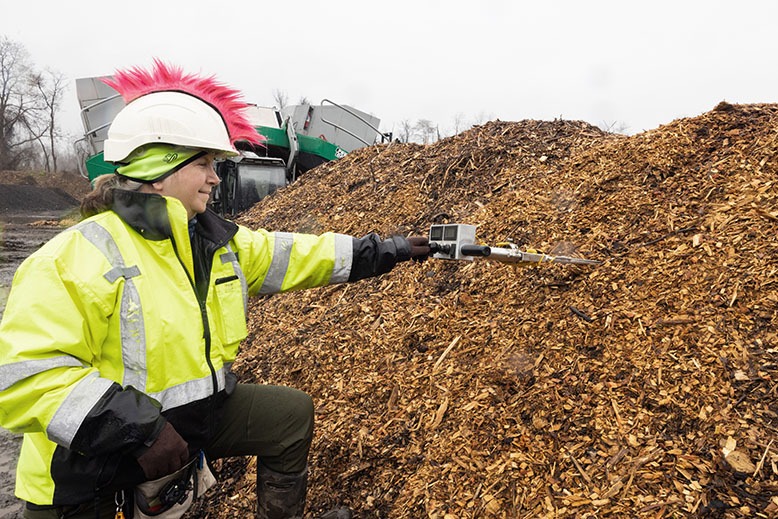
Site scientist Kristine Paff measures temperature and oxygen levels in a windrow. Photo by Christopher Lane
Some compost is converted to topsoil by mixing in sandy loam purchased from a local quarry. From food-waste deposit to a product ready for removal and sale, the process takes 11-14 weeks. Paff may oversee more waste and finished product down the road.
Although the DEP has raised Ag Choice’s allowable annual intake substantially from their initial threshold of 5,000 cubic yards, the Fischers say they hope for another increase at their upcoming permit renewal, sometime in the next few years.
In the meantime, the near total lack of odor around those windrows is one reason the business has flourished where so many others have failed, according to Marie Kruzan, executive director of the Association of New Jersey Recyclers.
Kruzan cites multiple composters over the past few decades whose neighbors couldn’t bear the smells, whose processes hindered efficient decomposition, or whose end products proved to be inferior fertilizers. That’s a shame, she says, because the amount of raw material is virtually infinite.
“Food waste is approximately 25 percent of the waste stream, and it can be recycled,” adds Kruzan. “Composting is the next frontier for recycling.”
Pamela Weber-Leaf’s editorial career included the environment beat at two daily newspapers. She is a nonpracticing environmental lawyer.
No one knows New Jersey like we do. Sign up for one of our free newsletters here. Want a print magazine mailed to you? Purchase an issue from our online store.
